African Business leaders denied visa to attend business meeting in the U.S.
BY BOLA ISHOLA
(Editing by Alan Green)
The African Global Economic and Development Summit, an annual event held at the University of Southern California that brings together American business leaders and their African counterparts to foster partnerships, had no participants from Africa this year, as all of the 60 would-be participants from Africa were denied entry visas. Therefore, the event, held in Los Angeles March 16-18, took place with a much smaller number of attendees.
The rejected applicants are from several African countries including South Africa, Nigeria, Cameroon, Angola, Ethiopia, Ghana, Guinea and others, none of which is on Donald Trump’s travel ban list. There were no applicants from the three African countries on that list: Somalia, Sudan and Libya. However, observers feel the massive visa denial could be linked to the travel ban.
Mary Flowers, the event organizer and CEO of Global Green Development Group, an organization that does economic work in Africa, told reporters on Monday:
“I don’t know if it’s Trump or if it’s the fact that the embassies that have been discriminating for a long time see this as an opportunity, because of talk of the travel ban, to blatantly reject everyone.”
She also said: “These trade links create jobs for both America and Africa,” adding, with her frustration boiling to the surface:
“It’s unbelievable what’s going on. This conference puts Americans in touch with real people so they can do real business.”
The rejected applicants, Flowers said, were denied the visa despite providing required documentation including bank statements and properly records. She stressed that about 40% of visa applicants for the summit are rejected every year, but never everyone who applied. Prince Kojo Hilton, a Ghanaian artist who was scheduled to lead a session on filmmaking during the Summit, was quoted by the Voice of America as saying: “I was really disappointed when I went to the embassy,”
Observers note that this rejection is a new proof of the impact of Donald Trump’s anti-immigration and overall hostility to foreigners that has resulted, since he came to the White House, in a slump in U.S. tourism and closing the door to would-be visitors in a variety of occupations—doctors, technical workers, athletes and others.
The U.S. Department of Justice has declined commenting on the reasons of the rejection. The department said in a statement:
“We cannot speculate on whether someone may or may not be eligible for a visa, nor on any possible limitations […] Applications are refused if an applicant is found ineligible under the Immigration and Nationality Act or other provisions of US law.”
As a result of a past summit, Mary Flowers is currently involved in a power plant project in Nigeria, a country whose president Donald Trump called on the phone not too long after becoming president. Flowers, who represents Southern California as a member of the District Export Council affiliated with the U.S. Commerce Department, stressed the negative impact of this massive visa denial saying:
“We can’t have the government telling us to go do business with Africa and then you slam the doors in their face.”



